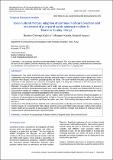| dc.contributor.author | Kipkirui, Beatrice Chelangat | |
| dc.contributor.author | Keraka, Margaret | |
| dc.contributor.author | Nyagero, Josephat | |
| dc.date.accessioned | 2022-03-01T11:34:38Z | |
| dc.date.available | 2022-03-01T11:34:38Z | |
| dc.date.issued | 2021-07 | |
| dc.identifier.citation | Kipkirui BC, Keraka M, Nyagero J. Socio-cultural factors, adoption of continuum of care practices and occurrence of puerperal sepsis amongst mothers in Kericho County, Kenya. Int J Community Med Public Health 2021;8:3246-54. | en_US |
| dc.identifier.issn | Print 2394-6032 | |
| dc.identifier.issn | Electronic 2394-6040 | |
| dc.identifier.uri | https://repository.amref.ac.ke/handle/123456789/599 | |
| dc.description | Copyright: © the author(s), publisher and licensee Medip Academy. This is an open-access article distributed under the terms of the Creative Commons Attribution Non-Commercial License, which permits unrestricted non-commercial use, distribution, and reproduction in any medium, provided the original work is properly cited. | en_US |
| dc.description.abstract | Background: This article examined socio-cultural factors and how they influence continuum of care practices and subsequently occurrence of puerperal sepsis amongst postnatal mothers. A cross-sectional research design and a mixed approach were adopted. Positivism paradigm guided the article. The study variables included socio-cultural factors, continuum of care practices and occurrence of puerperal sepsis. The study was conducted in Kericho County where participants were postnatal mothers and healthcare workers.
Methods: A sample of 385 postnatal mothers and 6 health care workers was considered by the study. A structured questionnaire and focus group discussion guide were used in data collection. The tools were pretested with the view of assessing their validity and reliability. The collected data were analyzed with the aid of the Statistical Package for Social Sciences tool. Descriptive and inferential statistics were used in the analysis.
Results: It was revealed that cultural factors such as religion, beliefs and services of midwives influenced adoption of continuum of care practices by postnatal mothers in Kericho County. Common puerperal sepsis that affect the aforesaid mothers included complications during PN period, pelvic pain, fever, foul-smelling discharge as well as involution of the uterus.
Conclusions: The article concludes that that socio-cultural practices are deeply entrenched in communities residing in Kericho County. It is recommended that cultural practices, norms and beliefs which dissuade mothers from seeking modern health services ought to be discouraged in order for the mothers to increase their adoption of continuum of care practices hence reducing occurrence of puerperal sepsis. | en_US |
| dc.language.iso | en | en_US |
| dc.publisher | International Journal of Community Medicine and Public Health | en_US |
| dc.subject | Continuum of care practices | en_US |
| dc.subject | Postnatal mothers | en_US |
| dc.subject | Puerperal sepsis | en_US |
| dc.title | Socio-cultural Factors, Adoption of Continuum of Care Practices and Occurrence of Puerperal Sepsis amongst Mothers in Kericho County, Kenya | en_US |
| dc.type | Article, Journal | en_US |

